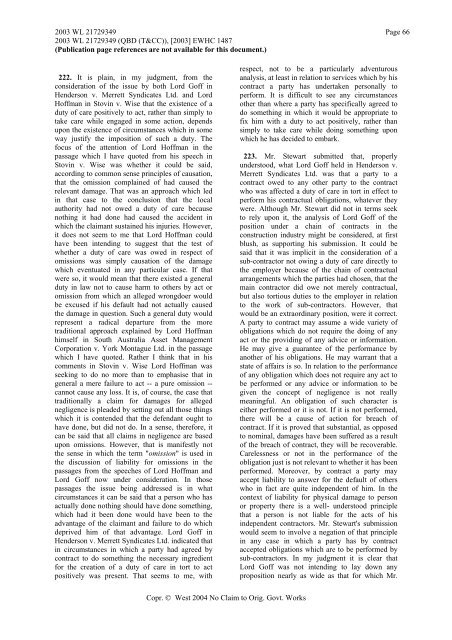Tesco v Constain - Thomson Reuters
Tesco v Constain - Thomson Reuters
Tesco v Constain - Thomson Reuters
You also want an ePaper? Increase the reach of your titles
YUMPU automatically turns print PDFs into web optimized ePapers that Google loves.
2003 WL 21729349 Page 662003 WL 21729349 (QBD (T&CC)), [2003] EWHC 1487(Publication page references are not available for this document.)222. It is plain, in my judgment, from theconsideration of the issue by both Lord Goff inHenderson v. Merrett Syndicates Ltd. and LordHoffman in Stovin v. Wise that the existence of aduty of care positively to act, rather than simply totake care while engaged in some action, dependsupon the existence of circumstances which in someway justify the imposition of such a duty. Thefocus of the attention of Lord Hoffman in thepassage which I have quoted from his speech inStovin v. Wise was whether it could be said,according to common sense principles of causation,that the omission complained of had caused therelevant damage. That was an approach which ledin that case to the conclusion that the localauthority had not owed a duty of care becausenothing it had done had caused the accident inwhich the claimant sustained his injuries. However,it does not seem to me that Lord Hoffman couldhave been intending to suggest that the test ofwhether a duty of care was owed in respect ofomissions was simply causation of the damagewhich eventuated in any particular case. If thatwere so, it would mean that there existed a generalduty in law not to cause harm to others by act oromission from which an alleged wrongdoer wouldbe excused if his default had not actually causedthe damage in question. Such a general duty wouldrepresent a radical departure from the moretraditional approach explained by Lord Hoffmanhimself in South Australia Asset ManagementCorporation v. York Montague Ltd. in the passagewhich I have quoted. Rather I think that in hiscomments in Stovin v. Wise Lord Hoffman wasseeking to do no more than to emphasise that ingeneral a mere failure to act -- a pure omission --cannot cause any loss. It is, of course, the case thattraditionally a claim for damages for allegednegligence is pleaded by setting out all those thingswhich it is contended that the defendant ought tohave done, but did not do. In a sense, therefore, itcan be said that all claims in negligence are basedupon omissions. However, that is manifestly notthe sense in which the term "omission" is used inthe discussion of liability for omissions in thepassages from the speeches of Lord Hoffman andLord Goff now under consideration. In thosepassages the issue being addressed is in whatcircumstances it can be said that a person who hasactually done nothing should have done something,which had it been done would have been to theadvantage of the claimant and failure to do whichdeprived him of that advantage. Lord Goff inHenderson v. Merrett Syndicates Ltd. indicated thatin circumstances in which a party had agreed bycontract to do something the necessary ingredientfor the creation of a duty of care in tort to actpositively was present. That seems to me, withrespect, not to be a particularly adventurousanalysis, at least in relation to services which by hiscontract a party has undertaken personally toperform. It is difficult to see any circumstancesother than where a party has specifically agreed todo something in which it would be appropriate tofix him with a duty to act positively, rather thansimply to take care while doing something uponwhich he has decided to embark.223. Mr. Stewart submitted that, properlyunderstood, what Lord Goff held in Henderson v.Merrett Syndicates Ltd. was that a party to acontract owed to any other party to the contractwho was affected a duty of care in tort in effect toperform his contractual obligations, whatever theywere. Although Mr. Stewart did not in terms seekto rely upon it, the analysis of Lord Goff of theposition under a chain of contracts in theconstruction industry might be considered, at firstblush, as supporting his submission. It could besaid that it was implicit in the consideration of asub-contractor not owing a duty of care directly tothe employer because of the chain of contractualarrangements which the parties had chosen, that themain contractor did owe not merely contractual,but also tortious duties to the employer in relationto the work of sub-contractors. However, thatwould be an extraordinary position, were it correct.A party to contract may assume a wide variety ofobligations which do not require the doing of anyact or the providing of any advice or information.He may give a guarantee of the performance byanother of his obligations. He may warrant that astate of affairs is so. In relation to the performanceof any obligation which does not require any act tobe performed or any advice or information to begiven the concept of negligence is not reallymeaningful. An obligation of such character iseither performed or it is not. If it is not performed,there will be a cause of action for breach ofcontract. If it is proved that substantial, as opposedto nominal, damages have been suffered as a resultof the breach of contract, they will be recoverable.Carelessness or not in the performance of theobligation just is not relevant to whether it has beenperformed. Moreover, by contract a party mayaccept liability to answer for the default of otherswho in fact are quite independent of him. In thecontext of liability for physical damage to personor property there is a well- understood principlethat a person is not liable for the acts of hisindependent contractors. Mr. Stewart's submissionwould seem to involve a negation of that principlein any case in which a party has by contractaccepted obligations which are to be performed bysub-contractors. In my judgment it is clear thatLord Goff was not intending to lay down anyproposition nearly as wide as that for which Mr.Copr. © West 2004 No Claim to Orig. Govt. Works
















